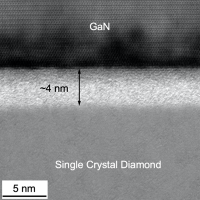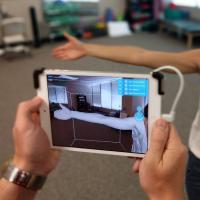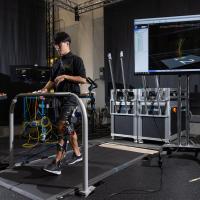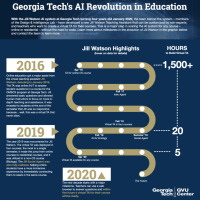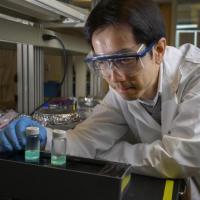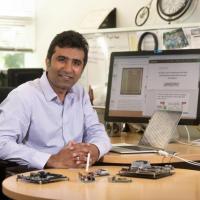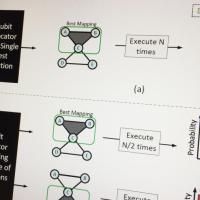In January 2014, the Georgia Institute of Technology, Udacity and AT&T teamed up to launch the first Master of Science in Computer Science degree from an accredited university that students could earn exclusively through the "massive online" format. This collaboration—informally dubbed "OMS CS"—brings together leaders in education, MOOCs and…
A room-temperature bonding technique for integrating wide bandgap materials such as gallium nitride (GaN) with thermally conducting materials such as diamond could boost the cooling effect on GaN devices and facilitate better performance through higher power levels, longer device lifetime, improved reliability, and reduced manufacturing costs. The…
Some 20 percent of breast cancer survivors will suffer from lymphedema, a potentially severe side effect of treatment that makes arms swell with lymph. The disease is often overlooked, but commercially available app-based technology now makes early detection easier, allowing for proactive treatment. The lymphedema monitoring technology originated…
You see and want the glass of milk on the table across the room. That’s no problem for most of us, who will simply walk to the table, grab the glass, and enjoy the milk. Triggering all of that limb movement is a complex set of coordinated neuromuscular commands and actions, which are not so simple for that segment of the population with, say,…
Thousands of people focused on the future of Georgia Tech by helping us complete phase one — visioning and drafting — of Georgia Tech’s strategic planning process. Now, the process moves into the goal setting phase that will include an opportunity for review and input from the Georgia Tech community. Since October 2019, more than 5,700 students,…
Georgia Tech has launched a new “Small Bets” Seed Grant Program that will award up to $75,000 for a year’s work aimed at addressing some of society’s most difficult challenges. The aim is to catalyze new research collaborations and fuel high-risk, high-reward approaches. Unlike traditional competitive peer-reviewed grant processes, the “Small…
Georgia Tech’s most well-known artificially intelligent teaching assistant, Jill Watson, turns four years old this January. The brainchild of Ashok Goel, professor in Interactive Computing, and launched at the start of 2016, the virtual TA was introduced into one of the courses for the then-fledgling Online Master of Science in Computer Science (…
Perovskite nanocrystals hold promise for improving a wide variety of optoelectronic devices – from lasers to light emitting diodes (LEDs) – but problems with their durability still limit the material’s broad commercial use. Researchers at the Georgia Institute of Technology have demonstrated a novel approach aimed at addressing the material’s…
The Georgia Institute of Technology, Sandia National Laboratories, and the Pacific Northwest National Laboratory are jointly launching a new research center to solve some of the most challenging problems in artificial intelligence (AI) today, thanks to $5.5 million in funding from the U.S. Department of Energy (DoE). AI enables computer systems…
In quantum computing, as in team building, a little diversity can help get the job done better, computer scientists have discovered. Unlike conventional computers, the processing in quantum-based machines is noisy, which produces error rates dramatically higher than those of silicon-based computers. So quantum operations are repeated thousands of…


